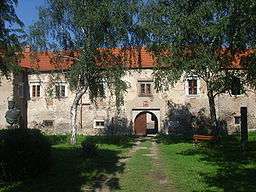
Borșa
Borșa (Romanian pronunciation: [ˈborʃa]; Hungarian: Borsa, German: Borscha, Yiddish: בורשא Borsha) is a town in eastern Maramureş County, northern Romania, in the valley of the Vişeu River and near the Prislop Pass. Linking Transylvania to Bukovina, Prislop Pass is surrounded by the Rodna and Maramureş Mountains, both ranges of the Carpathians. The highest peak in the region is Pietrosul Rodnei — 2,303 meters.
The Rodna National Park (which has an area of 463 km²) can be accessed from Borșa. The town is home to a wooden church, built in 1718. It administers one village, Băile Borșa.
In 1891 there were 1,432 Jews living in Borșa.
Natives
Population
Gallery

Houses in Borșa
Houses in Borșa

Houses in Borșa
Houses in Borșa

Church of the Moisei monastery
Church of the Moisei monastery

Pietrosu Mare near Borșa
Pietrosu Mare near Borșa


Horses' waterfall
Horses' waterfall





Borča
Borča (Serbian Cyrillic: Борча, pronounced [bɔ̂ːrt͡ʃa]) is an urban settlement near Belgrade, the capital of Serbia. It is located in the Belgrade's municipality of Palilula.
Location
Borča is located just 8 kilometers north of the downtown Belgrade, in the Banat section of the municipality of Palilula at 44.87° North, 20.45° East, at an altitude of 78 meters. It stretches between the Zrenjaninski put road (which connects Belgrade to the town of Zrenjanin in Vojvodina) and the slow streams of Pretok, Sebeš and Vizelj, which flows through the middle of the marshy area of Pančevački Rit, the northern part of the municipality of Palilula.
As Borča developed, it stretched along the Zrenjaninski put to the south (Krnjača's neighborhood of Dunavski Venac) and to the north (suburban settlement of Padinska Skela).
History
Early history
Earliest remains in the vicinity of modern settlement of Borča are from the bronze and iron age, but the medallions, figurines and coins from the 3rd and 4th century BC are also found. Because of the marshy area, not much is preserved, but the remains which confirm presence of the Sarmatians (including Iazyges) and Romans were found.

Borša
Borša (Hungarian: Borsi) is a village and municipality in the Trebišov District in the Košice Region of eastern Slovakia.
History
In historical records the village was first mentioned in 1221. Borša is the hometown of Francis II Rákóczi who was born here on 27 March, 1676.
Geography
The village lies at an altitude of 102 metres and covers an area of 9.54 km². It has a population of about 1250 people.
Ethnicity
The village has an absolute Hungarian majority.
In 1910 the village had 783 inhabitants, of which 778 were Hungarians.
Facilities
The village has a public library and a football pitch.
Genealogical resources
The records for genealogical research are available at the state archive "Statny Archiv in Kosice, Slovakia"
See also
External links
Podcasts:

-
by Brier
-
by Praiera
-
by Praiera
-
by Praiera
-
by Praiera
-
by Pro Era
Spancil Hill
by: BrierLast night as I lay dreaming of pleasant days gone by
Me mind being bent on rambling, to Ireland I did fly
I stepped on board a vision, and I followed with a will
'Til next I came to anchor at the cross at Spancil Hill
It being on the 23rd of June, the day before the fair
When Ireland's sons and daughters and friends assembled there
The young, the old, the brave and the bold came, their duty to fulfill
At the parish church in Clooney, a mile from Spancil Hill
I went to see me neighbors, to see what they might say
The old ones were all dead and gone, the young ones turning gray
But I met the tailor Quigley, he's as bold as ever still
Ah, he used to mend me britches when I lived in Spancil Hill
I paid a flying visit to my first and only love
She's as white as any lily, gentle as a dove
And she threw her arms around me saying, "Johnny, I love you still"
As she's Nell the farmer's daughter and the pride of Spancil Hill
I dreamed I held and kissed her as in the days of yore
Ah Johnny, you're only jokin', as many's the time before
Then the cock, he crew in the morning, he crew both loud and shrill
